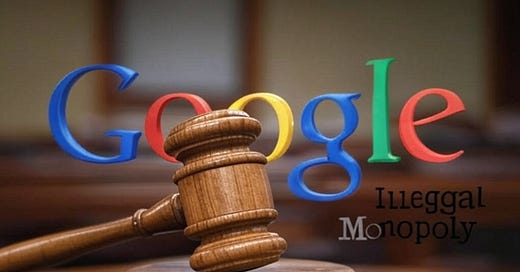BREAKING: U.S. Judge Declares Google’s Ad Tech Business an Illegal Monopoly Amid Global Clampdown
Is the breakup of Google no longer a possibility — but merely a matter of time?
Google’s Ad Tech Business an Illegal Monopoly
San Francisco | April 17, 2025 — In a landmark ruling with sweeping global implications, Google has been found guilty of illegally monopolizing digital advertising technology in the United States following a high-stakes civil antitrust lawsuit filed by the Department of Justice, further intensifying the global backlash against the tech giant’s market dominance.
The decision, issued Thursday by U.S. District Judge Leonie Brinkema in Virginia, marks the second time in under a year that Google has been declared an abusive monopolist by a federal court. This time, the ruling centers on the company’s powerful advertising infrastructure, which underpins a major portion of the $1.8 trillion empire built around Google Search, YouTube, Chrome, and Android.
Judge’s Scathing Remarks
“For over a decade, Google has tied its publisher ad server and ad exchange together through contractual policies and technological integration, which enabled the company to establish and protect its monopoly power in these two markets,” Judge Brinkema wrote in her 115-page opinion. “Google further entrenched its monopoly power by imposing anticompetitive policies on its customers and eliminating desirable product features.”
The civil lawsuit, filed in January 2023 during the Biden administration, accused Google of abusing its control over the digital ad ecosystem to marginalize competitors, restrict publisher freedom, and manipulate ad pricing to its own advantage. After a lengthy trial that concluded just before Thanksgiving 2024, the court sided substantially with the Justice Department’s argument that Google’s conduct harmed competition and undermined the free press by squeezing publisher revenues.
The upcoming penalty phase, expected to begin later this year or early 2026, could result in a court-ordered breakup of parts of Google's ad business. Meanwhile, remedy hearings in a separate civil monopoly case concerning Google Search are scheduled to begin Monday in Washington D.C., where the DOJ is reportedly seeking the divestiture of the Chrome web browser.
Google Responds: “We Disagree With the Court’s Decision”
Google immediately pushed back on the ruling, signaling it will challenge the outcome through the appeals process.
“We disagree with the Court’s decision regarding our publisher tools,” said Lee-Anne Mulholland, Google’s vice president of regulatory affairs. “Publishers have many options and they choose Google because our ad tech tools are simple, affordable and effective.”
As in its defense during the search monopoly case, Google’s legal team argued that the Department of Justice’s civil complaint was based on outdated definitions of the ad market and failed to account for aggressive competition from Meta, Amazon, Microsoft, and others. Karen Dunn, Google’s lead trial lawyer, opened the trial with a memorable dismissal of the DOJ’s framing, calling it “a time capsule with a BlackBerry, an iPod and a Blockbuster video card.”
Nonetheless, the court found the government’s evidence persuasive: that Google’s vertically integrated control over publisher tools, advertiser platforms, and real-time ad exchanges distorted the open-market dynamics of online advertising and forced media companies into dependency.
Witnesses from Gannett and News Corp. testified about the difficulty of avoiding Google’s ad stack, citing lack of alternatives and shrinking revenues that have compromised their ability to fund quality journalism.
A Worldwide Pattern: EU Fines, Indian Penalties, and Regulatory Heat
This U.S. ruling comes amid a global crackdown on Google’s market behavior.
In the European Union, regulators have already imposed over €8 billion in fines on Google across three key cases involving Android, Google Shopping, and AdSense. Multiple additional investigations are ongoing into whether Google unfairly advantages its own services and impedes competitors in digital advertising and app markets. The European Commission has signaled that structural separation — including the breakup of Google’s ad tech stack — is now under serious consideration.
In India, the Competition Commission of India (CCI) has levied ₹2,274 crore (approximately $275 million) in penalties across two landmark cases. These involved Google's abuse of dominance in the Android ecosystem and restrictive practices in the Play Store’s billing systems. The CCI’s orders required Google to unbundle its apps and cease coercive policies that limited user and developer choice.
Although Google has appealed the CCI’s orders in Indian courts and the matter is now before the Supreme Court of India, no stay has been granted — meaning both the findings and the penalties remain enforceable.
The Tide Turns: Is the Breakup of Google Now Inevitable?
As speculation mounts, the breakup of Google appears to be shifting from regulatory theory to impending reality. Austin, Texas-based Bilawal Sidhu, a former Senior Product Manager at Google and now also our Honorary Tech Advisor, said he would welcome such a move from the perspective of a vested equity holder, noting it could lead to “some unlocking of value.” At the same time, he offered a note of caution, observing that “even now the various Google divisions operate as watertight compartments,” and expressing doubt about whether independently spun-off companies would be able to effectively “leverage their synergies.”
With legal battles underway, global penalties stacking up, and structural remedies actively pursued on multiple fronts, one question now demands serious attention:
Is the breakup of Google no longer just a possibility — but a matter of when, not if?




